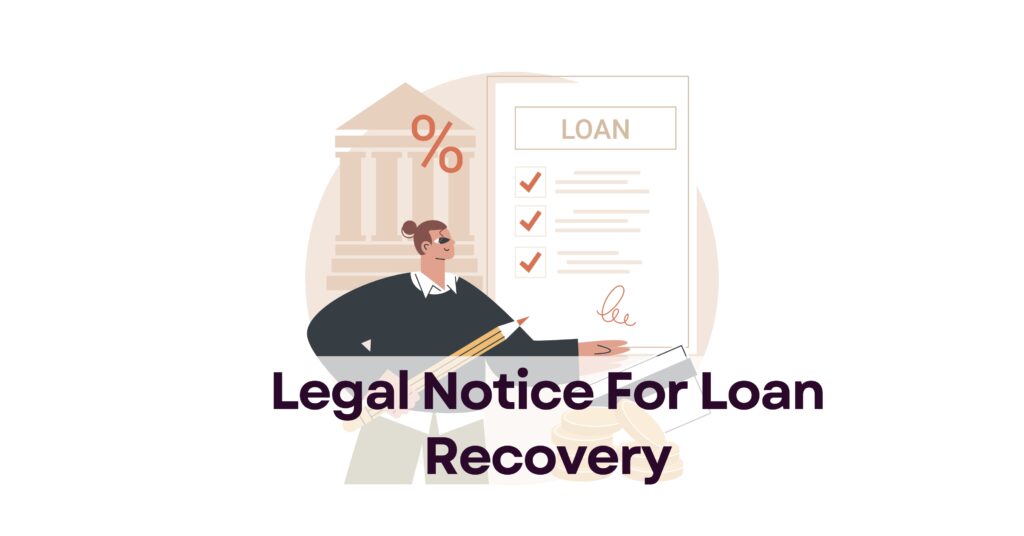
Table of Contents
Legal notice to recover loan amount is a formal legal document sent by the creditor (who lent the money) to the debtor (who took the money), to return the remaining amount. It is a legal step towards the recovery of that given amount. Whether it’s a friend, relative, business partner, or colleague, you have legal rights when someone doesn’t return your money. It’s not just an intimidation; it’s an official, legally backed demand that shows you’re serious. It gives the borrower a final opportunity to repay before legal action begins.
Let’s break it down step by step.
Can I send a legal notice for loan recovery to a friend?
Yes, absolutely. People often feel awkward about sending a legal notice to a friend or family member. But if someone borrowed money with a promise to repay, and they haven’t, you can legally demand it.
What legal actions can I take for my loan recovery?
A legal notice is the first step. If the borrower still doesn’t pay, you have multiple legal options:
1. File a civil suit under the Civil Procedure Code to recover principal + interest.
2. Criminal Case under Section 420 IPC (318 BNS) if you can show the borrower never intended to return the money.
3. If they gave a cheque that bounced, file a case under the Negotiable Instruments Act.
A legal notice strengthens your case in every one of these scenarios.
What should be the format for loan recovery legal notice?
A legal notice format for loan recovery should clearly mention:
- Your name and address
- Borrower’s name and address
- Amount borrowed
- Mode of loan payment
- Date the loan was given
- Agreed repayment terms (if any)
- How many chances you gave them
- Exact amount due today (with or without interest)
- A clear demand for payment within a defined time
- Statement that legal action will follow if unpaid
Do I need anything to send a legal notice for loan recovery?
Yes, you’ll need basic information and supporting proof:

Documents helpful for your lawyer:
- Bank transfer receipt / UPI screenshot
- Written acknowledgment
- WhatsApp or SMS proof
- Email confirmations
- Promissory note or IOU (if any)
- Cheque copy (if issued)
Even if it was a friendly loan, any record showing that they accepted money from you strengthens your notice.
How to send a legal notice for loan recovery from a friend?
Here’s the correct and legally safe way to do it:
1. Consult or hire a lawyer because a notice is taken seriously when sent through an advocate.
2. Share complete loan details with the advocate
- Loan amount
- Date given
- Mode of transfer
- Screenshots or messages
- Attempts made to recover
3. The lawyer drafts the notice
4. You review and approve the draft
5. The notice is sent to the borrower
6. Usually, the borrower gets a deadline to respond, such as 7 to 30 days.
7. If they ignore it or deny repayment, you can file a civil or criminal case depending on the situation.
Also Read – Legal Notice for Recovery of Money from Bank
How can eDrafter help me send legal notice?
If you want a professional and legally strong notice without stress, eDrafter makes it easy.
Here’s how it works:
- Visit the website
- Select Legal Notice service
- Fill in your details
- Upload any documents
- We connect you with a legal expert
- An advocate drafts your notice
- You review and approve it
- We send it to the borrower via registered post
- You receive dispatch proof
Why sending a legal notice helps?
A legal notice for loan recovery:
- Creates official legal pressure
- Shows you’re prepared to take action
- Gives the borrower a final chance
- Builds evidence for court if needed
- Helps resolve the dispute before a case is filed
Conclusion
If someone owes you money and keeps delaying, you don’t have to stay silent or feel helpless. A legal notice for recovery of loan amount is your first strong legal move. It’s professional, lawful, and often enough to make the borrower act. Whether it was a friendly loan, a personal loan, or business capital your money is yours. With eDrafter, you don’t need legal knowledge or courtroom experience. We take care of the drafting, legal wording, and official delivery while you stay informed and in control. If someone has borrowed money and won’t return it, take the first step now. Send a legal notice. Demand what’s yours. And let the law do the rest.

